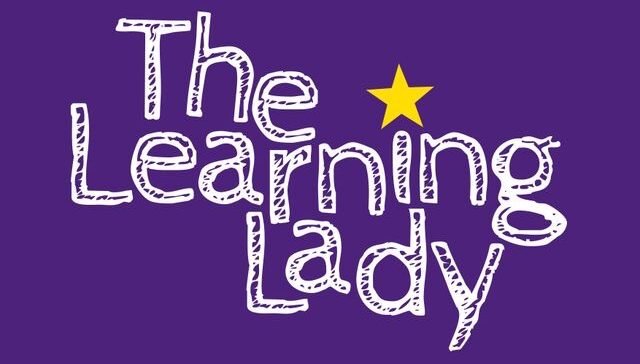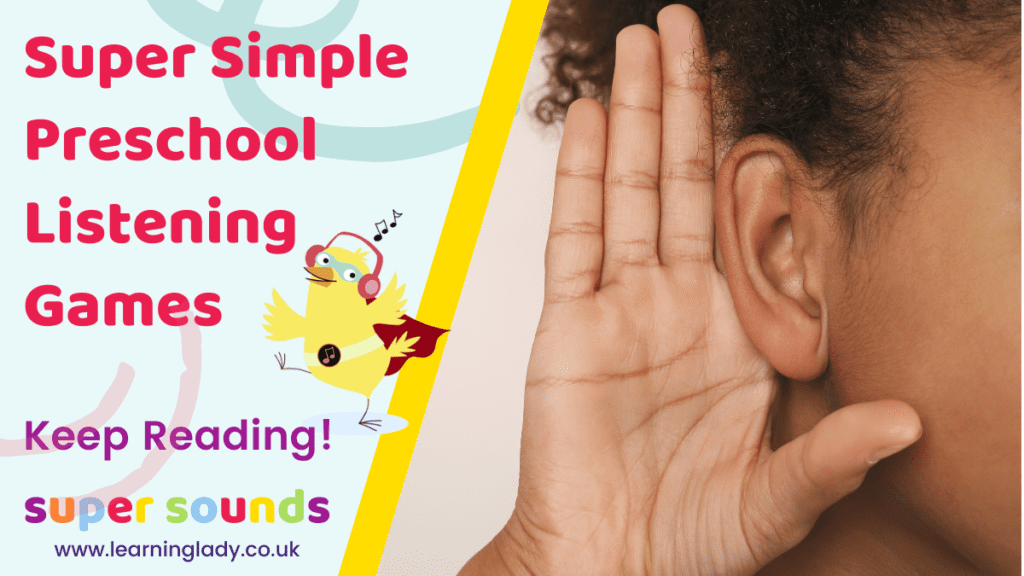Are you looking for preschool listening games to develop key listening skills with your 2,3 and 4-year-olds? Follow in the footsteps of Ladybirds Class with these good listening games and get started straight away!
Preschool Listening Games in Ladybird Class
It was the end of the preschool year when I met The Ladybirds. A fun-loving, energetic bunch of preschoolers who were delighted to engage with everything the Nursery had to offer. However, there was a problem. The staff were desperate for new listening games for 3 year olds.
Why listening games for early years are so important
Preschool listening games help our Early Years children to spot the differences and similarities in sounds and words. Children who have played lots of early years listening games have trained their ears well; they have good auditory discrimination. That means they can spot the similarities and differences between the sounds they hear in the world around them, sounds made by actions (like clapping or stamping), or sounds made by simple instruments. They can also identify the differences in words which sound similar like “chain” and “train”.
Building essential auditory discrimination skills
The best listening games for preschool develop auditory discrimination by teaching the children to match the sounds they hear, with objects, pictures or actions corresponding to those sounds.
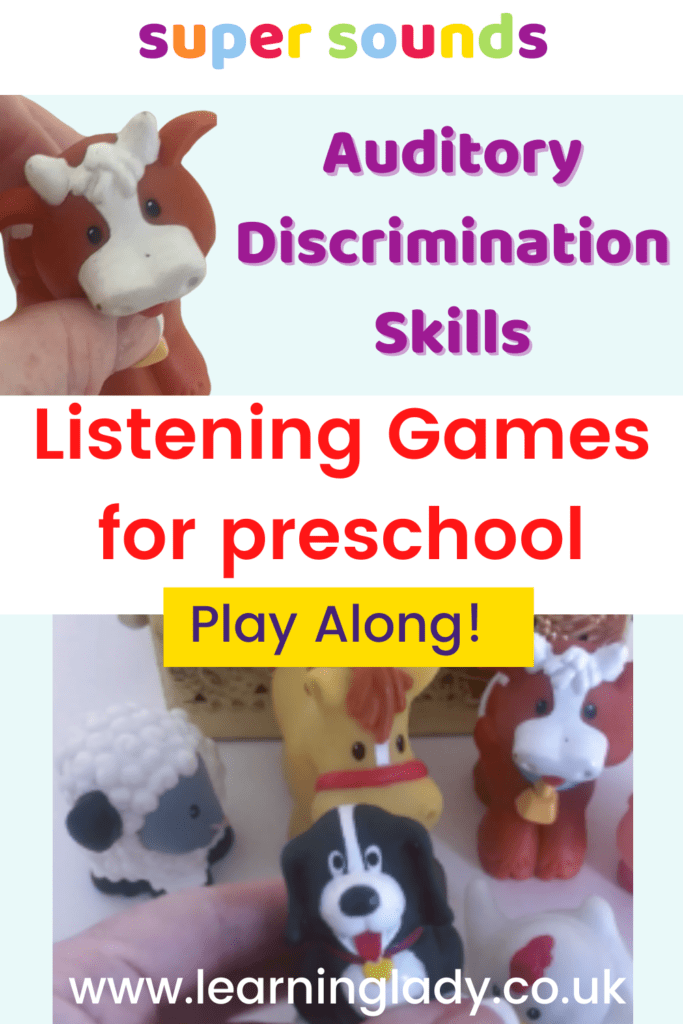
We need more listening games for preschool!
The Ladybirds’ teacher was really concerned about some of the preschoolers. They really struggled with listening, attention, and remembering. “We just need more listening games for preschool” she told me. The staff knew that there would be an expectation for these children to begin Phonics straight away when they started full-time school and were worried that their struggles with listening would make this a huge challenge.
I worked with the Ladybirds staff team to explore some fun and engaging early years listening games that we knew the Ladybirds would love.
We started with stories.....
First, we looked at the books the children were struggling to engage with. We reviewed the books for length, quality and purpose in developing listening, attention and engagement. We thought about whether these books would be helpful as a starting point for some good listening games. Here is what the Ladybirds team concluded….
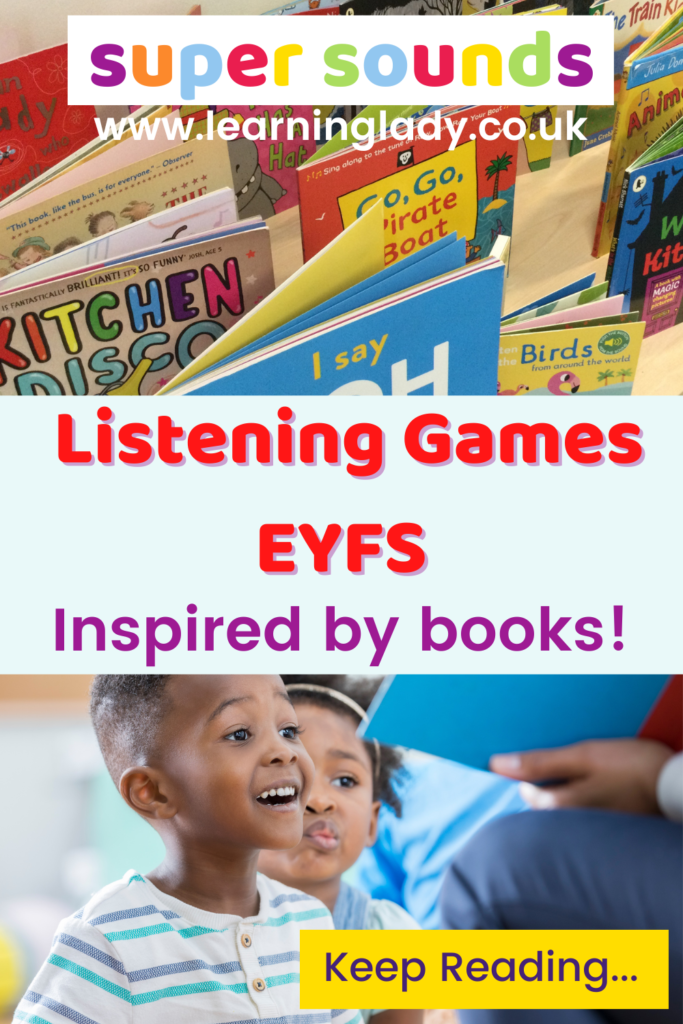
Many of the books were too long
Over time, staff had considered interests (such as pirates, The Gruffalo, Peppa Pig, and Dinosaurs), above the skill level of the children. The children weren’t listening well because the books didn’t support their current listening ability.
There weren’t enough books which encouraged audience participation
To introduce listening games based on books, the stories needed lots of opportunities to make sounds and join in with actions. Books like There’s an alien in my book by Tom Fletcher or We’re going on a bear hunt by Michael Rosen and Helen Oxenbury are great examples.
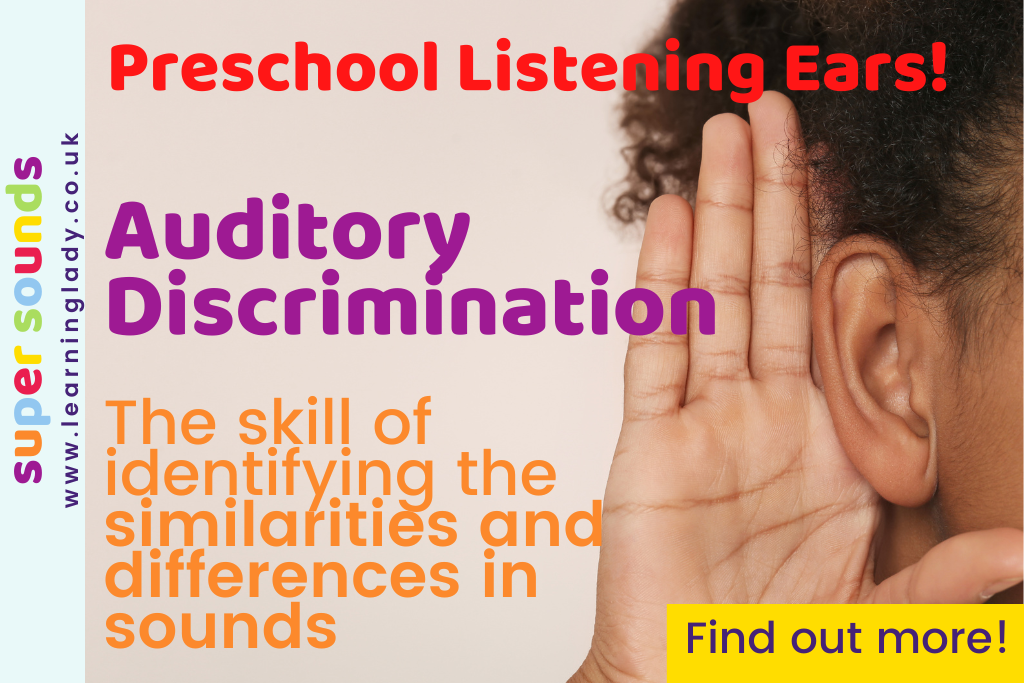
What listening games eyfs do you already play?
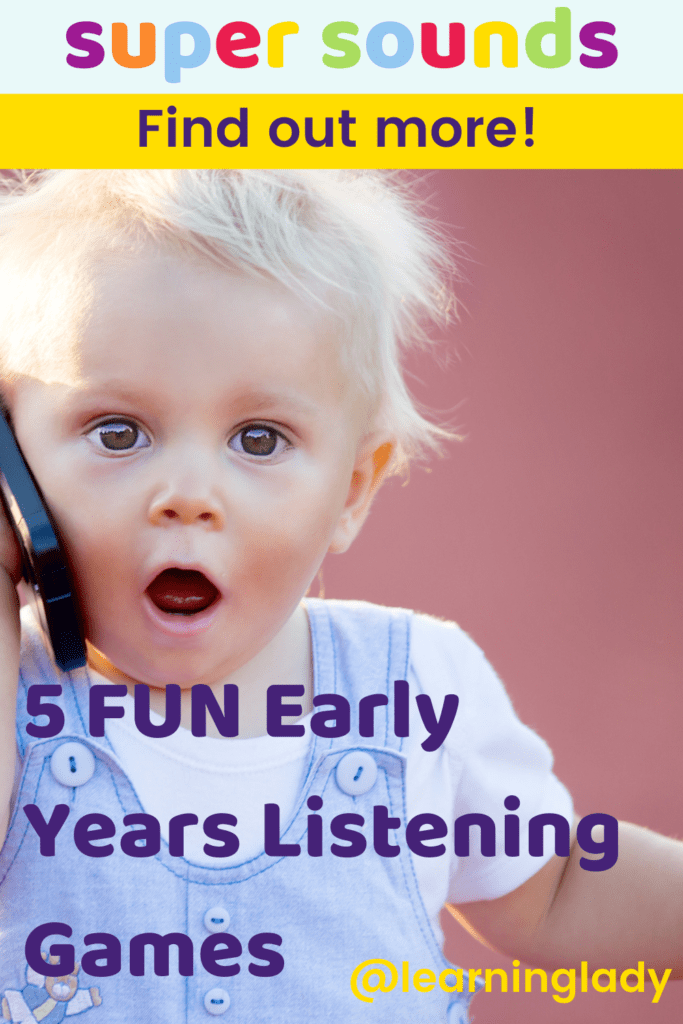
“What listening games for early years do you already play?” I asked the staff in Ladybirds Class. The Nursery teacher recalled Phase 1 Phonics games like What’s in the box, Sounds Bingo, and Noisy Neighbours from Letters and Sounds Phase 1 . The staff were quick to admit that most of these had become really tired and weren’t exactly inspiring the adults, let alone the children.
They needed some new ideas!
Preschool Listening Games | Guess the sound
As a starting point, I recommended some simple Guess the Sounds games online. We talked about including these in the preschool curriculum or sharing them with families to support listening games for 3-year-olds at home.
Some of the classic listening games for preschoolers are the best! This game takes a classic clapping ‘echoing’ game to the next level, with ideas for simple clapping patterns that you can use straight away!
Preschool listening games: Pass the whisper
Another classic to add to your listening games preschool list.
Whisper a word, then pass it from child to child around the circle. Will the same word make it round the circle?
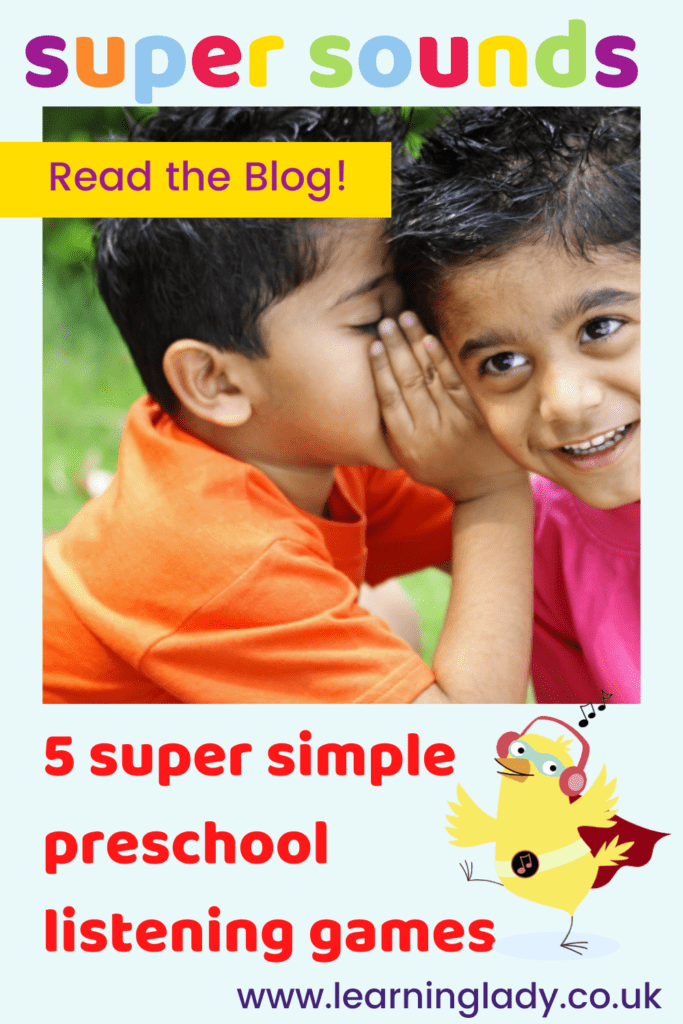
Preschool listening games: Listen to the shopping
Simply add this to your preschool listening games with things you can find in the kitchen. The staff at Ladybirds were surprised with what they came up with!
What you need
A large shopping bag or shopping basket.
Noise making items.
For example, a packet of crisps to crunch, some keys to rattle, opening a bottle of fizzy drink, a packet of cereal to shake, some coins in a purse to jingle, a mobile phone with a familiar ring tone. Try and find as many different sounding everyday items as you can.
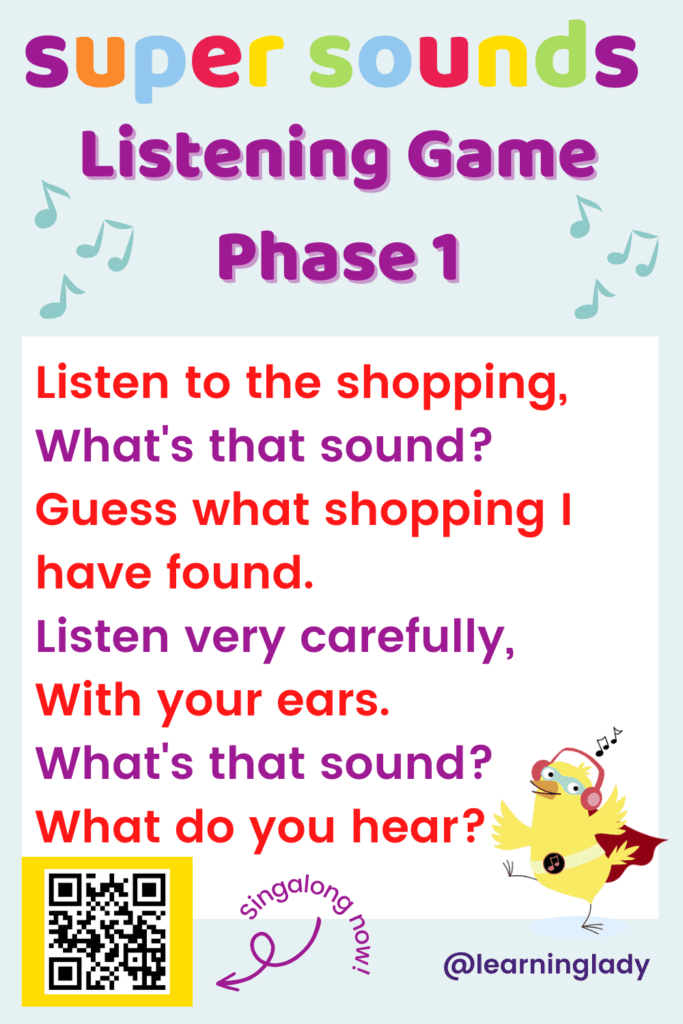
How to play
- Talk with the children about their experiences of going shopping and what they have seen at the shops.
- Show the children the objects that will be going into the shopping bag.
- Model using the objects to make the noises, demonstrating how to describe them as you put each into the shopping bag. For example, “In goes the cereal, that makes a shaking sound, in goes the fizzy drink, that makes a fizzing sound.”
- Explain that the children are going to play a guessing game just by listening. They will need to sit quietly and listen carefully so that they can hear the sounds.
- Sing the shopping bag song all together (see above).
- Make a noise with one of the objects inside the bag- choose the loudest / most obvious sound first.
- What can the children hear? Can they name the object? Can they describe the sound?
Can they say why they think it is that object? - Encourage the use of descriptive sentences by building on what the children say. For example, “You think it’s the crisps because they sound crunchy.” “You think it’s the lemonade because it sounds fizzy.”
- If the children are struggling to name the object, you could show them the photos of the objects to give then some options.
- Perform a big reveal by taking the sound making object out of the bag. Let the children take it in turns to make the sounds themselves using the shopping item, modelling the language as they make the sounds.For example, “The lemonade makes a fizzing sound”
- Repeat the game until all the sounds have been guessed.
Preschool listening games: Noisy Eggs
Noisy Eggs was one of the preschool listening games that the preschoolers in Ladybirds Class loved the most. They really got involved with making their own eggs and played with them on their own, way after the game with the adults had finished.
Click here for some plastic eggs to make your own Noisy Eggs
This is a great game to play with the book The Odd Egg by Emily Gravett.
Sharing the changes with families
The Ladybirds needed lots of listening practise which meant continuing beyond their time in Nursery. The Nursery teacher shared the listening games for preschoolers online with families and filmed the children playing some of the new listening games for their parents to watch.
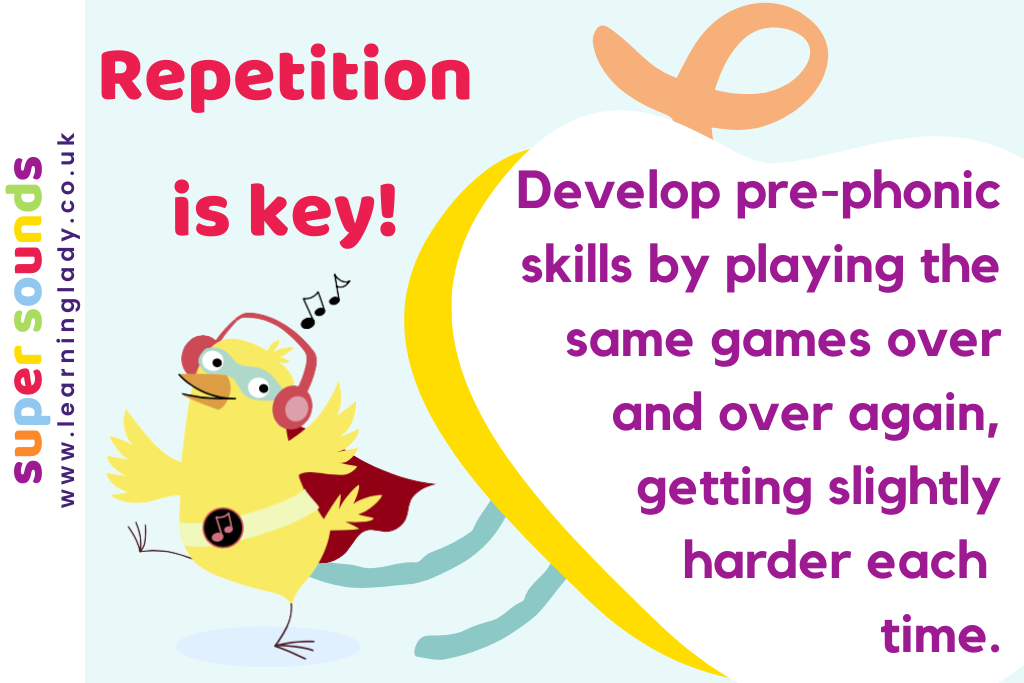
The impact on the little ladybirds!
A lot of hard work had gone into improving listening and attention and remembering skills in Ladybirds Class.
The impact of this work was instant!
In comparison with the first time I watched the little Ladybirds at story and circle time, they looked like different children. Key things I spotted:
- All children were engaged and involved because the staff had considered the needs of their skill development, as well as their interests.
- Carpet time was a participation event. Children were encouraged to join in, make sounds and become involved as much as possible.
- All staff were more enthusiastic about the games they were playing. They liked the simplicity of the traditional games and the high interest in the new ones!
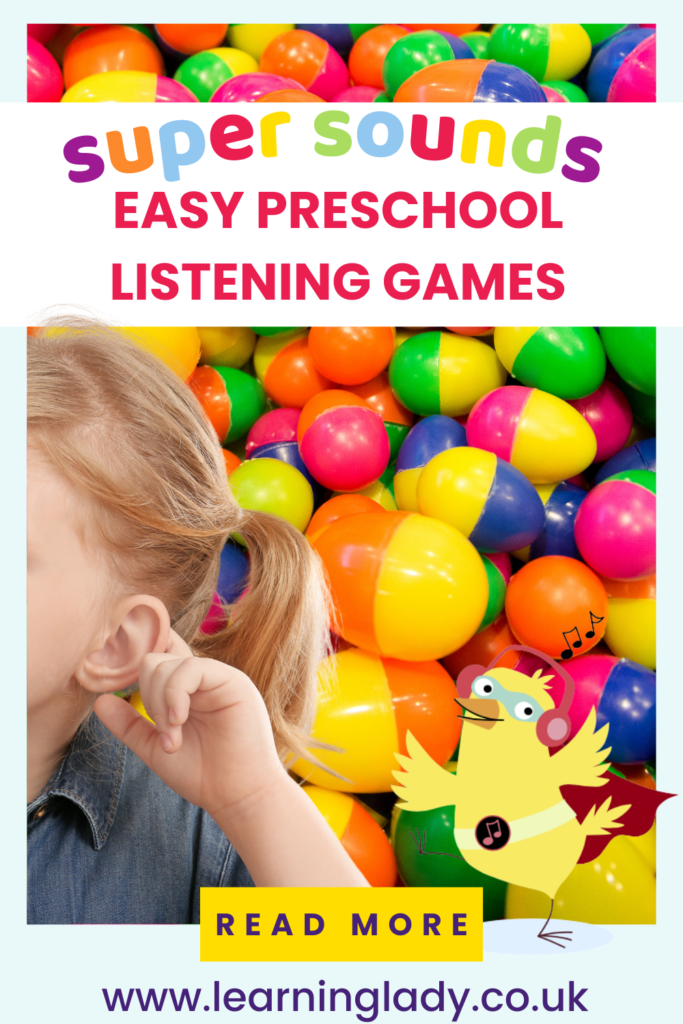
The Nursery teacher was no longer concerned about listening in Ladybirds. She admitted that she initially felt that this was a big change and had been worried. She couldn’t believe the progress The Ladybirds had made in a short space of time, just from a few small tweaks.
And she was delighted!
Learn more about preschool listening games...
Find Out More about Phonics in Preschool and Nursery
Recommended books for preschool listening and Phase 1 Phonics
Super Sounds by The Learning Lady
Ready for Reading with The Learning Lady
What comes before Phonics? by Sally Neaum
The Cheeky Elf | Phase 1 phonics listening and attention skills at Christmas!
More Phase 1 Phonics ideas on Pinterest
